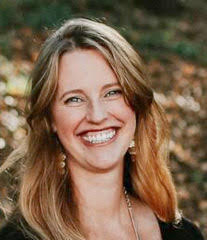|
One of the emotional experiences that often accompanies trauma is that of abandonment. The feeling of being utterly alone and vulnerable and feeling that one could not find the resources within one’s self to handle the crisis at hand in the moment (But be confident, we use the word “survivor” for a reason! Those resources were present and accessed as evidenced by the person sitting across from you!). For those who identify with Abrahamic or monotheistic religions, this is a feeling of “God-forsakenness” - the sense that in the occurrence of their trauma, even God became absent. This feeling of being abandoned, perhaps betrayed, by even God, and the necessary changes that occur in their perceptions of God, faith, and religion in the aftermath of trauma, is what I refer to when I talk to directees about their “double dose of grief.” For many this is a difficult feeling to name, and depending on the faith tradition, even more difficult to talk about. Trauma often challenges both our conscious and unconscious theologies to the core. Unintegrated or untested beliefs about God’s presence in the world, God’s ways of interacting with people, “providence,” and many others come into sharp moments of cognitive dissonance when we try to make meaning out of what has happened. For some, this painful time of refining and shedding old beliefs will eventually result in a more grounded faith. Many survivors find that they are in fact able to discover that Love does still exist and is accessible in their new understanding of the world. For others, they may find that the old tradition does not adequately address reality as they now experience it and they will find homes in other traditions. A spiritual director can be a great asset during these delicate and tender transitions. There is quite a bit of nuance in this type of questioning. There is a difference between questioning one’s faith and questioning the rhythms and rituals of one’s tradition. The first brings us to the core of ourselves where we deal with existential loneliness. The latter may cause us to feel like a misfit in our community and so we deal with a more tangible loneliness. A director must tread softly on this hallowed and fertile ground. Assuming that for the most part, we meet with directees who are part of the same or similar faith traditions as ourself, we must challenge ourselves to be honest about how open-handed we are with our tradition. How do we view those of other traditions? How do we view those who “leave” our tradition? By what means do we truly believe God meets and interacts with our neighbors of other faiths? With us? Does our tradition or institution welcome evolving faith or will that be viewed as threatening? These questions will have to be answered by you and by your directee. The answers may become particularly complicated if the trauma that has been survived was directly connected to a betrayal from within the tradition -either from a specific person or institution. Particularly challenging can be the experience of feeling distant from, or within, one’s own tradition. This often means a loss of support, community, and rhythms that previously were held dear. Experiences and groups that often religious folks find their identity within. The rumblings of change in one person’s faith often causes ripples that are felt by the entire community, if it is close-knit. Does your directee feel safe to discuss what they are experiencing honestly with their spiritual leaders and friends? Do they feel supported, encouraged, and accepted as they explore? Trauma often challenges both our conscious and unconscious theologies to the core. Unintegrated or untested beliefs about God’s presence in the world, God’s ways of interacting with people, “providence,” and many others come into sharp moments of cognitive dissonance when we try to make meaning out of what has happened. Faith and religion, and the practices thereof, have been shown again and again to be powerful tools in building resilience and healing. The deeper one’s spirituality is integrated into one’s life, the more necessarily it will be affected by trauma, for better and for worse. When walking with survivors, the question is not “if” their experience of trauma will lead to some challenging questions about faith, it is “when.” As spiritual directors, we can hold space for these questions, and stand with our directees at these crossroads, with the deep intention of not adding to their grief, but helping them to experience joy. Recommended Further Reading: Healing Spiritual Abuse and Religious Addiction, by Matthew Linn, et al. Spirit and Trauma: A Theology of Remaining, by Shelly Rambo Trauma and Grace: Theology in a Ruptured World, by Serene Jones Erin Jantz received her Master’s Degree in Spiritual Formation and Soul Care from the Institute for Spiritual Formation. She also holds a B.A. in developmental psychology and has furthered her education with trainings in trauma care from Boston University and intensives with Dr. Bessel Van Der Kolk. She has been practicing spiritual direction since 2012, helped to author ICTG's Spiritual Formation Resource Guide, and also teaches and speaks on a variety of spiritual formation topics. Erin lives in Southern California with her husband and their four marvelous children.
0 Comments
Leave a Reply. |
�
SPIRITUAL DIRECTION BLOG
From 2012-2020, this blog space explored expanding understanding and best practices for holistic health in the context of spiritual direction.
This website serves as a historical mark of work the Institute conducted prior to 2022. This website is no longer updated. Archives
September 2020
Categories
All
|



 RSS Feed
RSS Feed
